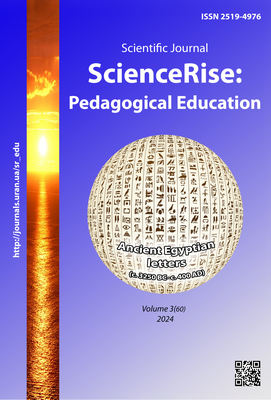Задачний підхід у формуванні самоосвітньої компетентності школярів (на засадах використання засобів цифрових технологій)
DOI:
https://doi.org/10.15587/2519-4984.2024.310380Ключові слова:
самоосвітня компетентність школяра, задачний підхід, цифрові технології, завдання, індивідуальна роботаАнотація
У статті розкрито можливості задачного підходу у вирішенні проблеми формування самоосвітньої компетентності школяра. Запропоновано на уроках, у домашній роботі і в індивідуальній роботі зі школярами різноманітні шляхи впливу на розвиток їх самоосвітньої компетентності через підготовку спеціальним чином підібраних задач. Обґрунтовано, що на уроках доцільним з точки зору формування самоосвітньої компетентності є застосування типових задач, аналогічних до типових, задач до самостійної роботи та творчих задач. Показано, що для організації домашньої роботи продуктивним є використання навчальних, тренувальних та пошукових задач. Розкрито, що у індивідуальній роботі результативним буде виконання підготовчих, спробних, основних задач. При цьому доведено, що всі означені типи задач передбачають активне використання засобів цифрових технологій, які дозволять ефективно організувати навчальну діяльність, покращать мотивацію та пізнавальний інтерес школярів, забезпечать індивідуалізацію навчання та створять передумови для розвитку самостійності школярів. На уроках доцільно використовувати прості цифрові додатки, цифрові ресурси для створення власного контенту, цифрові діяльнісні середовища та цифрові ресурси для онлайн-комунікації. У домашній роботі ефективно застосовувати цифрові ресурси-джерела освітньої інформації, засоби для самоконтролю та самодіагностики, а також ресурси для створення власного цифрового контенту. Для індивідуальної роботи школярів корисними є цифрові ресурси-джерела інформації, засоби для самоконтролю та самодіагностики, цифрові діяльнісні середовища та цифрові ресурси для персоналізованого навчання.
У статті досліджено потенціал задачного підходу щодо формування самоосвітньої компетентності школярів. Розглянуто основні компоненти самоосвітньої компетентності, а саме: мотиваційно-ціннісний, змістовно-процесуальний та контрольно-рефлексивний. Проаналізовано вплив задачного підходу на розвиток кожного з цих компонентів. Визначено, що задачний підхід сприяє підвищенню мотивації учнів до навчання, стимулює їхню пізнавальну активність та розвиває критичне мислення
Посилання
- Kovalenko, N. V. (2009). Formuvannia samoosvitnoi kompetentnosti uchniv osnovnoi shkoly silskoi mistsevosti [Doctoral dissertation].
- Maistriuk, I., Ponomarova, N. (2022). Concept Content and Structure of Self-Educational Competence of School Students in the Modern Educational Space. Educational Challenges, 27 (2), 122–137. https://doi.org/10.34142/2709-7986.2022.27.2.09
- Maistriuk, I. C. (2024). Zasoby tsyfrovykh tekhnolohii dlia samoosvity shkoliariv. Visnyk Skovorodynivskoi akademii molodykh uchenykh, 79–88.
- Olefirenko, N. V. (2015). Teoretychni i metodychni zasady profesiinoi pidhotovky maibutnikh uchyteliv pochatkovoi shkoly do proektuvannia dydaktychnykh elektronnykh resursiv [Doctoral dissertation].
- Komogorova, M. I. (2018). The concept of “task” and “exercise” in their system determined to provide students withlasting knowledge on humanitarian subjects. Pedahohichni nauky: realii ta perspektyvy, 29, 70–75.
- Ponomarova, N. O. (1998). Pedahohichni umovy vykorystannia piznavalnykh zadach u navchanni informatytsi [Doctoral dissertation].
- Vaschenko, L. (2014). Home taks as from of self – learning astivities of students. Naukovi zapysky Natsionalnoho pedahohichnoho universytetu im. M. P. Drahomanova, 119, 56‒65.
- Ponomarova, N. O., Olefirenko, N. V. (2024). Vybrani pytannia metodyky navchannia informatyky: zadachnyi pidkhid. Kharkiv, 97.
- Iatsenko, S. L. (2015). Sutnisni aspekty osobystisno oriientovanoi osvity. Problemy osvity, 85, 116–122.
- Vasylieva, D. V. (2019). Dystantsiine navchannia: Vchora. Sohodni. Zavtra. Kompiuter u shkoli ta simi, 1, 21–26.
- Ramskyi, Y. S., Yashchyk, O. B., Tverdokhlib, I. A., Ramskyi, A. Y. (2021). The use of open online courses in a blended learning environment in the training of future information technology specialists. Information Technologies and Learning Tools, 4 (84), 138–157. https://doi.org/10.33407/itlt.v84i4.4431
##submission.downloads##
Опубліковано
Як цитувати
Номер
Розділ
Ліцензія
Авторське право (c) 2024 Iryna Maistriuk

Ця робота ліцензується відповідно до Creative Commons Attribution 4.0 International License.
Наше видання використовує положення про авторські права Creative Commons CC BY для журналів відкритого доступу.
Автори, які публікуються у цьому журналі, погоджуються з наступними умовами:
1. Автори залишають за собою право на авторство своєї роботи та передають журналу право першої публікації цієї роботи на умовах ліцензії Creative Commons CC BY, котра дозволяє іншим особам вільно розповсюджувати опубліковану роботу з обов'язковим посиланням на авторів оригінальної роботи та першу публікацію роботи у цьому журналі.
2. Автори мають право укладати самостійні додаткові угоди щодо неексклюзивного розповсюдження роботи у тому вигляді, в якому вона була опублікована цим журналом (наприклад, розміщувати роботу в електронному сховищі установи або публікувати у складі монографії), за умови збереження посилання на першу публікацію роботи у цьому журналі.









